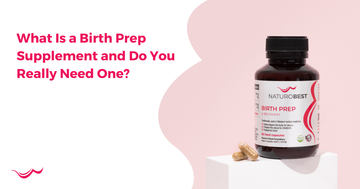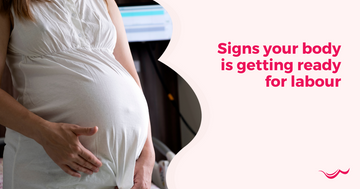How Can I Prepare for Labour?
by NaturoBest Naturopath Team on Jul 22, 2025

As your due date inches closer, it's completely normal to feel a mix of excitement and uncertainty.
You’ve spent months growing and nourishing your baby—but now your thoughts are shifting to the big event: labour. Questions start to arise: Will I know when it starts? Will my body cope? What can I do now to feel ready?
This final stretch of pregnancy is about more than just waiting. There’s a lot you can do to prepare—physically, mentally, and emotionally—for a more confident birth experience.
Why Labour Preparation Matters
Labour may only last a few hours—or sometimes, a day or more—but it’s one of the most physically demanding and emotionally intense things your body will ever do.
Your mindset, physical strength, and even the nutrients you've built up can all play a role in how you experience it. And while you can’t control every twist and turn, there are ways to prepare that help you feel more capable and in control.
By getting ready now, you’re not just preparing for the birth—you’re setting yourself up for a better recovery, and a more empowered transition into motherhood.
What to Start Doing in the Final Weeks of Pregnancy
1. Start Taking a Labour Support Formula (From 34 Weeks)
Certain herbs have traditionally been used to help prepare the uterus and cervix for birth.
Our Birth Prep & Recovery formula includes raspberry leaf and squaw vine—two well-known herbs in Western herbal medicine that support uterine tone and assist the body’s natural readiness for labour. Raspberry leaf in particular is often taken in the final six weeks of pregnancy to support a smoother second stage of labour.
These herbs are not about inducing labour—they’re about gently supporting your body’s own process as it nears the finish line.
💡Always speak with your healthcare provider before adding herbs or supplements in late pregnancy.
2. Focus on Nutritional Reserves for Birth and Beyond
As labour approaches, your nutritional needs shift from just supporting your pregnancy to preparing for birth and breastfeeding.
A prenatal that’s rich in activated B vitamins, iron bisglycinate, iodine, and choline can help maintain your energy and resilience as you prepare for delivery and postpartum recovery.
Our Prenatal Trimester 2 & 3 Plus Breastfeeding was designed to support women through the second and third trimesters and into the breastfeeding period—with well-absorbed nutrients to support your body when it’s working at full capacity.
3. Start Perineal Massage (Around 34–35 Weeks)
Perineal massage can help reduce the chance of tearing during birth and may also help you feel more familiar and relaxed with that part of your body.
To begin:
-
Use a natural, pregnancy-safe oil
-
Massage the perineum gently for a few minutes, a few times per week
-
If it feels uncomfortable at first, go slowly—this is about connection, not pressure
Many women find that adding this simple practice to their weekly routine builds both physical and mental readiness for birth.
4. Learn (and Practice) Labour Breathing Techniques
Breathing may sound basic—but during labour, it’s everything. Learning different types of breathwork now gives you tools to help manage pain, reduce anxiety, and stay present.
Start with:
-
Slow belly breathing for early labour
-
Rhythmic patterned breathing (like 4 in, 4 out) for contractions
-
Relaxation breathing between contractions to stay calm
There are plenty of free birth preparation apps and YouTube videos that demonstrate these techniques. Practising now can help them feel like second nature when labour begins.
5. Get Familiar With Labour Positions and Movement
Staying mobile and upright in labour can make contractions more productive—and often more manageable.
Try:
-
Walking
-
Rocking on a birth ball
-
Squatting or leaning over a chair or bed
-
Kneeling or hands-and-knees positions
Think of it as helping your baby find the best position to be born—while keeping you as comfortable as possible.
6. Start Creating Your Birth Preferences (Plan)
It’s helpful to map out your preferences—even if your actual labour ends up looking different.
Things to think about:
-
Pain relief (Are you open to epidurals? Want to try water immersion first?)
-
Birth environment (Lighting, music, who’s present)
-
Positions you'd like to try for birth
-
Preferences for delayed cord clamping or skin-to-skin
Keep it flexible, but write it down. It’s a great way to communicate with your birth team and clarify your values ahead of time.
Things to Stop Doing in the Final Weeks of Pregnancy
1. Stop Putting Off Rest
There’s often a push to “get everything done” before baby arrives—but now is the time to slow down, not speed up. Labour is physically demanding. Think of rest as part of your training.
Say no to late-night nesting sprees, unnecessary errands, or anything that depletes your energy. Your body is preparing for a major event—give it the downtime it deserves.
2. Stop Over-Googling Every Cramp or Symptom
The final weeks can be full of mysterious sensations—Braxton Hicks, pelvic pressure, back aches. It’s tempting to search for answers at 2am, but too much information can lead to anxiety.
If something feels off, always speak with your healthcare provider. Otherwise, trust that your body is doing its job—even if it doesn’t always feel comfortable.
3. Stop Neglecting Recovery Planning
It’s easy to focus so much on the birth that recovery barely crosses your mind. But your postpartum period deserves preparation too.
Start thinking about:
-
Freezing meals
-
Stocking postpartum care supplies (pads, ice packs, comfy clothes)
-
Lining up emotional support for the early days
-
Continuing with a postnatal supplement like Prenatal Trimester 2 & 3 Plus Breastfeeding
-
Continuing Birth Prep & Recovery post-birth to support tissue healing and tone
Your body is doing something remarkable—treat it with care during the early weeks of motherhood.
The Impact of Your Labour Preparation
Labour doesn’t have to feel like something that happens to you. With a little intention and planning, you can approach birth feeling grounded, informed, and supported.
Whether it’s through gentle herbs, nutrient-rich supplements, practical breathing techniques, or simply getting enough sleep—your choices now can shape not only your labour but your postpartum recovery too.
It’s not about perfection. It’s about preparing in a way that helps you feel strong and ready.



